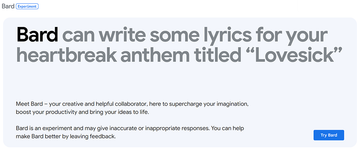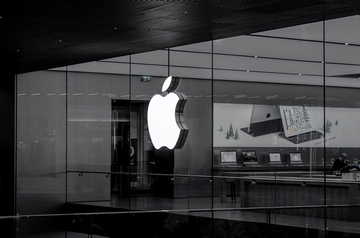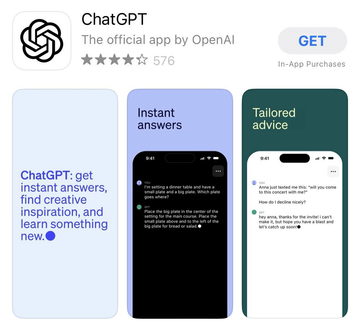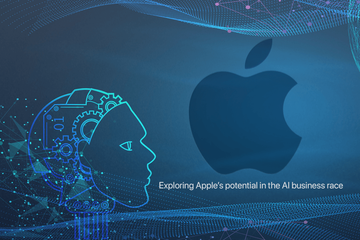From ChatGPT to Google Bard, fears over job displacement, and copyright infringement in the art world – it seems the generative AI revolution is underway. But where is Apple in the current AI business race? And what could their next move be?
This article explores the current uses of artificial intelligence technology, developments underway, and expert predictions regarding Apple’s future involvement.
What is generative AI?
If you spend any amount of time in the tech world, you’ve heard about AI. Big companies have been leveraging AI for years to detect patterns, analyze data, and spot anomalies.
You’re likely to have used AI-powered solutions in your daily life too, even before the buzz around chatbots and OpenAI. Think of dictation and voice assistants: they are made possible by traditional AI, which can isolate parts of speech, distinguish between voices, and piece together recorded sounds to ‘talk’ to the user.
You’re likely to have interacted with this kind of AI before. For example, speech recognition is used for automatic call distribution (ACD) and interactive voice response (IVR) systems. In short, the tools needed for managing a call center team are already powered by simple AI.
Generative AI, however, is a bit different. Unlike traditional AI, which is good at unpacking existing data, this newer type of artificial intelligence can actually create new data, such as images, text, or music.

Screenshot Sourced from bard.google.com
Generative AI could potentially revolutionize many industries, such as healthcare, finance, and entertainment. It could also shake up the world of mobile computing, improving and innovating augmented reality experiences, apps, photo and video quality, user experience, and more.
Still in its infancy in many ways, this new kind of artificial intelligence brings with it a host of new possibilities. The tools available to us (and sparking controversy) at the moment are just the beginning. If the technology continues rapidly improving, generative AI could be a massive part of our future.
The AI business race
Think back to the early days of the internet. Though no one could have predicted just how much the technology would shape our lives, dominating the web was as important to companies then as staking a claim to AI is now.
If generative AI is the future, then all major tech companies are going to want a piece of the action.
As more businesses invest in .ai domain names, implement chatbot customer service tools, and automate their approach to auditing, it's clear that AI is becoming a symbol of credibility in e-commerce spheres.
So, who will lead the way in the AI arms race? Tech giants Google, Microsoft, and OpenAI are prominent in the scene.
Google made this clear at its annual developer conference in May, introducing a new AI-infused version of search and an AI-powered chatbot, Google Bard.
Then there's Microsoft. In collaboration with OpenAI, Microsoft has created an AI-powered coding assistant, Copilot. Before that, Microsoft reshaped how more than a billion people work by incorporating generative AI into existing productivity apps like Word, PowerPoint, and Outlook.
While not a tech giant in the traditional sense, it's undeniable that OpenAI has been making waves. The hype around ChatGPT has brought public attention to the developments in AI across the board and arguably kick-started the race between other companies vying to get involved.
What about Apple?

Free to use image sourced from Unsplash
There's one key player, conspicuous only in its absence from the current generative AI gold rush: Apple.
Of course, Apple is not a stranger to AI.
Traditional AI has long been a feature of Apple software products. The iPhone is a huge part of daily life for many people (which is why it's so important to keep your iPhone safe). But many do not realize that AI is behind its beloved features.
Yet, in the current flurry of movement around generative AI, Apple has not made a move. While they certainly have the tools to bring out their own generative AI chatbot and could radically change the competition by doing so, there has been no dramatic unveiling yet.
So, is Apple content to sit on the sidelines? Or are they merely biding their time? Let's look at the top five predictions for Apple's future in artificial intelligence.
5 ways Apple might join the AI business race
1. Further integration in Apple's product range
While there hasn't been a flagship product launched, this does not mean that Apple is ignoring AI. One theory is that they are choosing not to put out a showy new product for the sake of competing.
Instead, they'll use the considerable tools at their disposal to continue quietly improving the AI capabilities of existing products.
This makes sense with what we know about Apple. As mentioned earlier, the brand has been leveraging AI in varying capacities for years, including:
- Predictive text on Apple keyboards
- AI camera features
- Face ID to unlock iPhones
- AI-narrated audiobooks on the iBooks store
- Photo recognition abilities allowing you to separate the object from the background of a picture
- Siri (more on this later)
Apple might choose to strengthen and improve existing networks by updating multiple products and software with AI technologies, thus creating a seamless and integrated user experience across devices.
This kind of holistic approach would boost interconnectivity and integration. Many business owners will appreciate the value of a well-connected system.
If you've ever looked into how to get a phone number for a business, you'll have quickly discovered the merits of having a virtual phone number that can be used across locations. United communications systems can be a game changer for businesses, big and small.
2. An improved AI-powered virtual assistant

Free to use image sourced from Unsplash
This second theory draws on the first. Siri is one of the original virtual assistants and is arguably overdue an upgrade. If Apple were looking to revamp an existing product to enter the AI business race, Siri might be the perfect candidate.
Some rumors suggest that teams at Apple – including those working on Siri – are regularly testing language-generating concepts. The theory goes that they could bring out their own large language model (LLM).
It's also possible that this AI-powered assistant will be the key ingredient in creating a seamless network of unified technologies.
A re-imagined AI-powered assistant could create a seamless and integrated user experience across all Apple devices. Not only would your devices be interconnected like never before, but the system would also be intelligent, proactive, and personalized.
A new and improved virtual assistant could be good news for businesses. AI could streamline admin tasks, scheduling, and workflow management. Imagine you've been tasked with planning a game production pipeline. It's an overwhelming amount of work, and the complexities seem endless.
Now imagine you had an assistant who was literally programmed to logically solve problems. Apple could lead the way in creating this miracle assistant.
3. Developments in music and entertainment
We already know that AI can understand and extract data from sound. Let's take the example of automated call distribution (ACD) in a call center to grasp the current uses of traditional AI.
What is ACD? ACD is the process of seamlessly distributing and connecting calls to the best available agents. During this process, many companies use interactive voice response to segment callers and funnel them in the right direction.
With generative AI, the possibilities go further. Perhaps Apple will spot an event coming up in your calendar and suggest a playlist to get you in the mood for it. Or the photo app could use AI to generate music to accompany slideshows. Or, most contentiously, generative AI could produce chart-topping music and soundscapes of its own.
One theory is that while other players are focused on chatbots, images, and words, Apple will sneak around the back and take the music and entertainment crown. From the iPod to iTunes, Apple has always demonstrated a clear interest in music. Then in 2022, they acquired AI Music, a startup which uses AI to generate personalized soundtracks and adaptive music.
4. No move from Apple
Then there's the theory that Apple won't join the AI business race at all.
Why won't Apple join the race? Arguably, they don't need to.
Firstly, Apple might continue stealthily integrating AI into existing products. People already trust these products, so there's no major competition.
Secondly, Apple does not need to compete. Whoever establishes dominance in the field of AI will likely deliver the services via the App Store.
As such, Apple will take a cut regardless of the victor. They can stay out of the competition by virtue of being the effective host.

Screenshot Sourced from the App Store
5. The wait-and-see approach
We know a few things about Apple for sure. They are notoriously secretive, have a unique security philosophy, and rarely make the first move.
Just think: Apple wasn’t the first company to bring out a tablet. But the iPad far outstripped the competition.
Apple may opt for a similar approach when it comes to AI. The possibilities may be exciting, but it’s worth being cautious when testing the boundaries of new innovations. Therefore, Apple might observe the initial frenzy without partaking, then later release a fully thought-out project that will eclipse the competition.
A cautious approach is advisable. Many who have worked on AI stress the importance of regulation. And there are still social and ethical considerations to work out before diving in too far.
Final thoughts
Whether the path is paved by OpenAI, Microsoft, Google, or Apple, it’s clear that AI advancements are going to play a role in how we interact with technology in the future.
For example, research has already been conducted combining SOX compliance checklist information technology with AI models. From audits to communication systems and domain names, AI-powered technologies are going to be hard for businesses to ignore.
